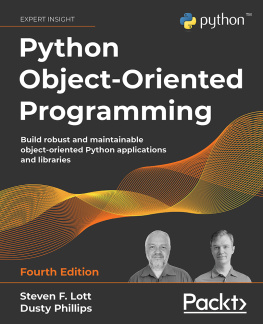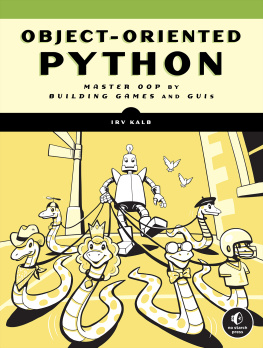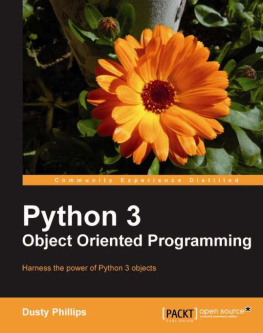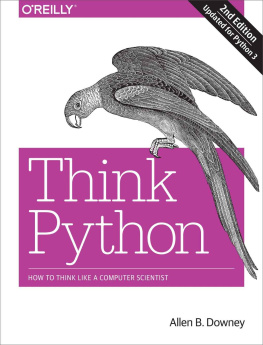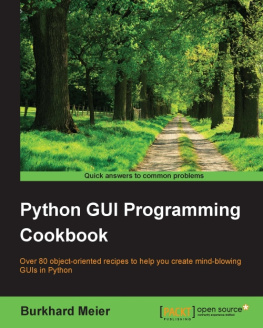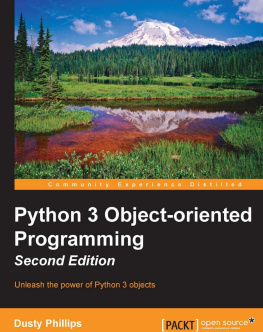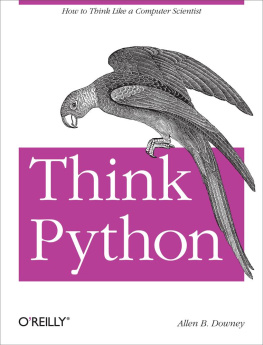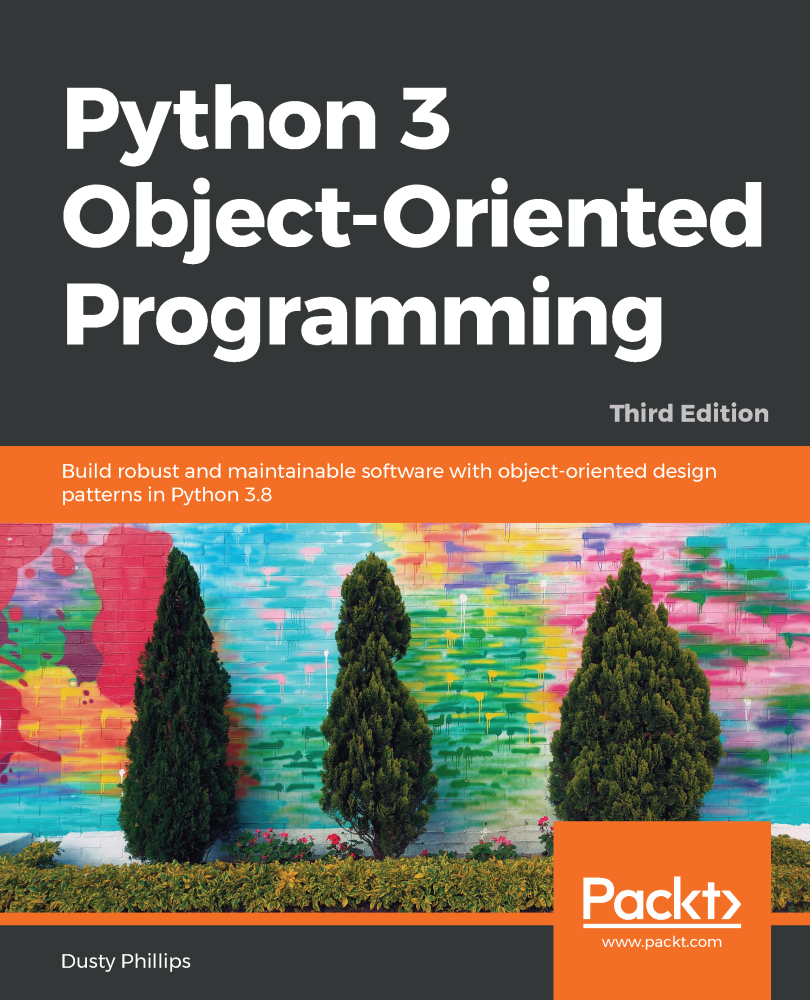
Python 3 Object-Oriented Programming
Third Edition
Build robust and maintainable software with object-oriented design patterns in Python 3.8
Dusty Phillips

BIRMINGHAM - MUMBAI
Python 3 Object-Oriented ProgrammingThird Edition
Copyright 2018 Packt Publishing
All rights reserved. No part of this book may be reproduced, stored in a retrieval system, or transmitted in any form or by any means, without the prior written permission of the publisher, except in the case of brief quotations embedded in critical articles or reviews.
Every effort has been made in the preparation of this book to ensure the accuracy of the information presented. However, the information contained in this book is sold without warranty, either express or implied. Neither the author, nor Packt Publishing or its dealers and distributors, will be held liable for any damages caused or alleged to have been caused directly or indirectly by this book.
Packt Publishing has endeavored to provide trademark information about all of the companies and products mentioned in this book by the appropriate use of capitals. However, Packt Publishing cannot guarantee the accuracy of this information.
Commissioning Editor: Richa Tripathi
Acquisition Editor: Chaitanya Nair
Content Development Editor: Rohit Kumar Singh
Technical Editor: Ketan Kamble
Copy Editor: Safis Editing
Project Coordinator: Vaidehi Sawant
Proofreader: Safis Editing
Indexer: Mariammal Chettiyar
Graphics: Alishon Mendonsa
Production Coordinator: Aparna Bhagat
First published: July 2010
Second edition: August 2015
Third edition: October 2018
Production reference: 2051118
Published by Packt Publishing Ltd.
Livery Place
35 Livery Street
Birmingham
B3 2PB, UK.
ISBN 978-1-78961-585-2
www.packt.com
mapt.io
Mapt is an online digital library that gives you full access to over 5,000 books and videos, as well as industry leading tools to help you plan your personal development and advance your career. For more information, please visit our website.
Why subscribe?
Spend less time learning and more time coding with practical eBooks and Videos from over 4,000 industry professionals
Improve your learning with Skill Plans built especially for you
Get a free eBook or video every month
Mapt is fully searchable
Copy and paste, print, and bookmark content
Packt.com
Did you know that Packt offers eBook versions of every book published, with PDF and ePub files available? You can upgrade to the eBook version at www.packt.com and as a print book customer, you are entitled to a discount on the eBook copy. Get in touch with us at customercare@packtpub.com for more details.
At www.packt.com , you can also read a collection of free technical articles, sign up for a range of free newsletters, and receive exclusive discounts and offers on Packt books and eBooks.
Contributors
About the author
Dusty Phillips is a Canadian software developer and author currently living in New Brunswick. He has been active in the open source community for two decades and has been programming in Python for nearly as long. He holds a master's degree in computer science and has worked for Facebook, the United Nations, and several start-ups. He's currently researching privacy-preserving technology at beanstalk.network.
Python 3 Object-Oriented Programming was his first book. He has also written Creating Apps in Kivy, and self-published Hacking Happy, a journey to mental wellness for the technically inclined. A work of fiction is coming as well, so stay tuned!
About the reviewers
Yogendra Sharma is a developer with experience of the architecture, design, and development of scalable and distributed applications. He was awarded a bachelor's degree from Rajasthan Technical University in computer science. With a core interest in microservices and Spring, he also has hands-on experience technologies such as AWS Cloud, Python, J2EE, Node.js, JavaScript, Angular, MongoDB, and Docker. Currently, he works as an IoT and cloud architect at Intelizign Engineering Services, Pune.
Josh Smith has been coding professionally in Python, JavaScript, and C# for over 5 years, but has loved programming since learning Pascal over 20 years ago. Python is his default language for personal and professional projects. He believes code should be simple, goal-oriented, and maintainable. Josh works in data automation and lives in St. Louis, Missouri, with his wife and two children.
Packt is searching for authors like you
If you're interested in becoming an author for Packt, please visit authors.packtpub.com and apply today. We have worked with thousands of developers and tech professionals, just like you, to help them share their insight with the global tech community. You can make a general application, apply for a specific hot topic that we are recruiting an author for, or submit your own idea.
Preface
This book introduces the terminology of the object-oriented paradigm. It focuses on object-oriented design with step-by-step examples. It guides us from simple inheritance, one of the most useful tools in the object-oriented programmer's toolbox, through exception handling to design patterns, an object-oriented way of looking at object-oriented concepts.
Along the way, we'll learn how to integrate the object-oriented and the not-so-object-oriented aspects of the Python programming language. We will learn the complexities of string and file manipulation, emphasizing the difference between binary and textual data.
We'll then cover the joys of unit testing, using not one, but two unit testing frameworks. Finally, we'll explore, through Python's various concurrency paradigms, how to make objects work well together at the same time.
Each chapter includes relevant examples and a case study that collects the chapter's contents into a working (if not complete) program.
Who this book is for
This book specifically targets people who are new to object-oriented programming. It assumes you have basic Python skills. You'll learn object-oriented principles in depth. It is particularly useful f or system administrators who h ave used Python as a glue language and would like to improve their programming skills.
Alternatively, if you are familiar with object-oriented programming in other languages, then this book will help you understand the idiomatic ways to apply your knowledge in the Python ecosystem.
What this book covers
This book is loosely divided into four major parts. In the first four chapters, we will dive into the formal principles of object-oriented programming and how Python leverages them. In ,
Next page

